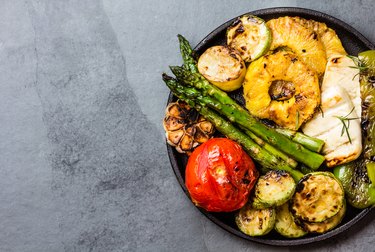
The George Foreman grill works as a contact grill. This means that the machine's hot metal parts grill the food from both sides, much like a sandwich toaster. Although originally designed for meat, you can also use your George Foreman to grill vegetables.
When grilling your vegetables, note that cooking time varies for different veggies, as explained in the user's manual. Remove any excess moisture and cook the vegetables quickly to get the best possible grilled flavor from your George Foreman machine.
Video of the Day
Video of the Day
Tip
Cooking veggies on a George Foreman grill in a few simple steps: prep, heat the grill, cook and serve. Be mindful that cooking time varies depending on the vegetables you include.
Step 1: Prepare Your Veggies
Prepare your vegetables. Cut vegetables such as zucchini, eggplant or carrot into thick slices at least 1/2 inch thick. Break cauliflower and broccoli into small pieces around 1 inch thick.
The size of the vegetable slices is important, as explained by the University of Nebraska-Lincoln. If you slice the vegetables too thinly, they may not touch both sides of the grill when it is closed; too thick and the vegetables won't cook properly in the middle.
Read more: 9 Must-Know Indoor Grilling Hacks
Step 2: Rinse and Dry
Rinse each piece of vegetable with water and blot them totally dry on a piece of kitchen towel. Absorb as much moisture as you can, particularly with watery vegetables such as zucchini.
Step 3: Baste With Oil
Use a basting brush to cover the vegetables in a very thin layer of olive oil. Sprinkle on as much pepper and salt as you prefer.
Step 4: Heat the Grill
Turn on the George Foreman grill and allow it to heat up fully. Open the top to make it easy to insert the vegetables.
Step 5: Space Them Out
Space the vegetables in a single layer on the grill. Don't stack the vegetables or they won't cook evenly.
Step 6: Grill Your Veggies
Grill the vegetables for four to six minutes, depending on the thickness and type of vegetable. Follow the recommendations in the recipes provided at ForemanGrillRecipes.com.
Step 7: Remove and Enjoy
Remove the vegetables from the George Foreman grill when they're soft but still slightly firm.
Read more: Do Vegetables Lose Nutrients When Cooked?
Get Your Vitamins and Minerals
Include a variety of vegetables, such as zucchini, to get your vitamins and minerals in your George Foreman grill healthy recipes. Zucchini is a good source of vitamin C, with 20 milligrams per cup, according to the USDA. This provides 22 percent of the recommended daily value for men and 27 percent for women, according to the National Academies of Sciences. Zucchini also provides minerals, including calcium, iron, magnesium, potassium and zinc.
Tip
- Cook soft vegetables, such as tomatoes, quickly and lay the lid down gently to avoid squashing and bruising the slices.
- Try squirting a little lemon juice on the vegetables while grilling for an extra zesty flavor.
- For a healthy sweet option, try grilling fruits such as pineapple and peaches.
Warning
Use tongs or a spatula to remove vegetables from the grill; the metal will be extremely hot.
- University of Nebraska-Lincoln: "Grilling Fruits and Vegetables on a Double-Sided Grill"
- Use and Care Manuals: "George Foreman Owner's Manual"
- Foreman Grill Recipes: "Foreman Grill Vegetable and Fruit Recipes"
- National Academies of Sciences: "Vitamins and Minerals"
- USDA FoodData Central: "Squash, Summer, Zucchini, Includes Skin, Raw"